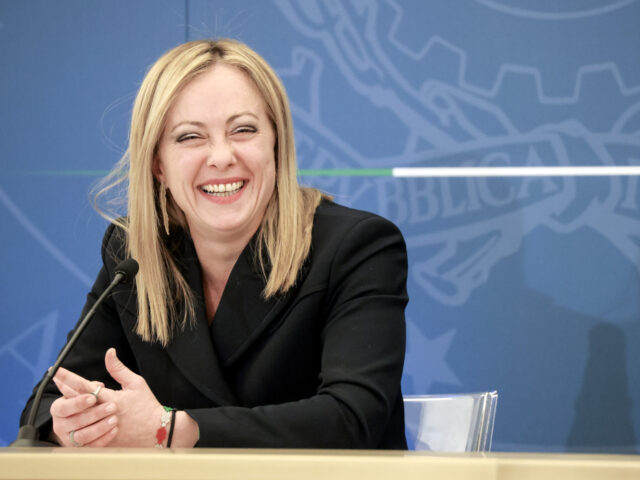Italian Prime Minister Giorgia Meloni’s Brothers of Italy (FdI) are polling at nearly 30 per cent nationally after Meloni formed the new government, becoming the country’s first female Prime Minister.
The new poll, released by the firm SWG, puts Meloni’s Brothers of Italy (FdI) at 29.1 per cent, continuing a trend of increased popularity since her party won 26 per cent of the vote in September’s national election.
The centre-right alliance that Meloni leads in the new government, which includes populist Matteo Salvini’s League and Silvio Berlusconi’s Forza Italia, polled at 43.5 per cent overall, the newspaper Il Giornale reports.
While the popularity of Meloni and the FdI increases, the left-wing Democratic Party (PD), who placed second in the election, have seen a fall in polls and is now tied with the Five Star Movement (M5S) at 16.3 per cent each.
Fireband social conservative Giorgia Meloni became Italy’s first-ever female prime minister on Friday following the approval from Italian President Sergio Mattarella to form Italy’s next government. https://t.co/QLrY9CGzya
— Breitbart News (@BreitbartNews) October 22, 2022
Another poll released by the firm Ipsos just a few days prior to the SWG poll puts Meloni’s party on an even more favourable footing at a record 29.8 per cent.
Following the election in September, it was revealed that Meloni and her coalition allies had managed great successes in Italian regions that were previously deemed to be traditional strongholds of the left, such as Tuscany and Emilia Romagna, where the Brothers of Italy and the League made gains.
The result was compared to the victory of former UK Prime Minister Boris Johnson who smashed through the “red wall” that was once dominated by the left-wing Labour Party, although this historic achievement has since been squandered in Britain.
Ipsos data released after the election also showed that Meloni’s party had become the most popular with workers and the middle class, while the upper-middle-class and those who had been university-educated tended to place their vote with the Democratic Party.
“These elections, even more than the previous ones, have shown how the traditional reference groups of each party have disappeared,” Nando Pagnoncelli, the head of Ipsos, said.
Giorgia Meloni’s Brothers of Italy were the most popular party among workers and the middle class in last weekend’s election, while the wealthiest Italians, along with university graduates, were more likely to vote for left parties. https://t.co/R1hW01QTAr
— Breitbart News (@BreitbartNews) September 29, 2022

COMMENTS
Please let us know if you're having issues with commenting.